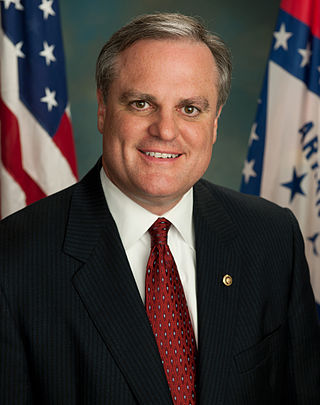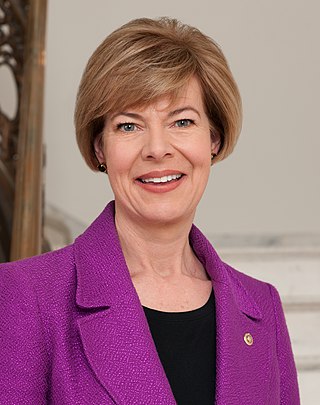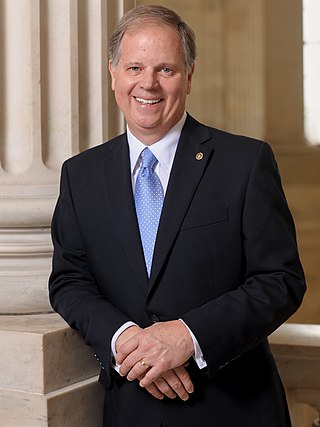
Mark Lunsford Pryor is an American attorney, politician and lobbyist who served as a United States Senator from Arkansas from 2003 to 2015. He previously served as Attorney General of Arkansas from 1999 to 2003 and in the Arkansas House of Representatives from 1991 to 1995. He is a member of the Democratic Party.

Tammy Suzanne Green Baldwin is an American politician and lawyer who has served as the junior United States senator from Wisconsin since 2013. A member of the Democratic Party, she served three terms in the Wisconsin State Assembly, representing the 78th district, and from 1999 to 2013 represented Wisconsin's 2nd congressional district in the United States House of Representatives. In 2012, Baldwin was elected to the United States Senate, defeating Republican nominee Tommy Thompson. In 2018, Baldwin was reelected, defeating Republican nominee Leah Vukmir. On April 12, 2023, Baldwin announced her candidacy for reelection in the 2024 Senate election in Wisconsin.

Gun politics is defined in the United States by two primary opposing ideologies concerning the private ownership of firearms. Those who advocate for gun control support increasingly restrictive regulation of gun ownership; those who advocate for gun rights oppose increased restriction, or support the liberalization of gun ownership. These groups typically disagree on the interpretation of the text, history and tradition of the laws and judicial opinions concerning gun ownership in the United States and the meaning of the Second Amendment to the Constitution of the United States. American gun politics involves these groups' further disagreement concerning the role of firearms in public safety, the studied effects of ownership of firearms on public health and safety, and the role of guns in national and state crime.

The Children's Health Insurance Program (CHIP) – formerly known as the State Children's Health Insurance Program (SCHIP) – is a program administered by the United States Department of Health and Human Services that provides matching funds to states for health insurance to families with children. The program was designed to cover uninsured children in families with incomes that are modest but too high to qualify for Medicaid. The program was passed into law as part of the Balanced Budget Act of 1997, and the statutory authority for CHIP is under title XXI of the Social Security Act.

Thomas Stewart Udall is an American diplomat, lawyer, and politician serving as the United States Ambassador to New Zealand and Samoa since 2021. A member of the Democratic Party, he served as a United States senator from New Mexico from 2009 to 2021. Udall also served as the U.S. representative for New Mexico's 3rd congressional district from 1999 to 2009 and New Mexico Attorney General from 1991 to 1999. Born in Tucson, Arizona to the Udall family, he is the son of former U.S. Representative and Secretary of the Interior Stewart Udall and the nephew of former U.S. Representative Mo Udall. His cousin is Mark Udall, who concurrently served alongside him in the Senate representing the neighboring state of Colorado.

The Violence Against Women Act of 1994 (VAWA) is a United States federal law signed by President Bill Clinton on September 13, 1994. The Act provided $1.6 billion toward investigation and prosecution of violent crimes against women, imposed automatic and mandatory restitution on those convicted, and allowed civil redress when prosecutors chose to not prosecute cases. The Act also established the Office on Violence Against Women within the U.S. Department of Justice.

Christopher Scott Murphy is an American lawyer, author, and politician serving as the junior United States senator from Connecticut since 2013. A member of the Democratic Party, he previously served in the United States House of Representatives, representing Connecticut's 5th congressional district from 2007 to 2013. Before being elected to Congress, Murphy was a member of both chambers of the Connecticut General Assembly, serving two terms each in the Connecticut House of Representatives (1999–2003) and the Connecticut Senate (2003–2007).

The Second Chance Act of 2007, titled "To reauthorize the grant program for reentry of offenders into the community in the Omnibus Crime Control and Safe Streets Act of 1968, to improve reentry planning and implementation, and for other purposes," was submitted to the House by Representative Danny Davis (D-IL) to amend the Omnibus Crime Control and Safe Streets Act of 1968 to reauthorize, rewrite, and expand provisions for adult and juvenile offender state and local reentry demonstration projects to provide expanded services to offenders and their families for reentry into society. H.R. 1593 was signed into law April 9, 2008.

James Paul Lankford is an American politician serving as the senior United States senator from Oklahoma. A member of the Republican Party, Lankford has represented Oklahoma in the U.S. Senate since 2015. Before his Senate service, he represented Oklahoma's 5th congressional district in the U.S. House of Representatives from 2011 to 2015.
The New York Secure Ammunition and Firearms Enforcement Act of 2013, commonly known as the NY SAFE Act, is a gun control law in the state of New York. The law was passed by the New York State Legislature and was signed into law by Governor of New York Andrew Cuomo in January 2013. The legislation was written in response to the Sandy Hook Elementary School shooting in Newtown, Connecticut, and the Webster, New York, shooting. Cuomo described the law as the toughest gun control law in the United States.
After the Sandy Hook Elementary School shooting, multiple gun laws were proposed in the United States at the federal and state levels. The shooting renewed debate about gun control. The debates focused on requiring background checks on all firearm sales, and on passing new and expanded assault weapon and high-capacity magazine bans.

The 21st Century Cures Act is a United States law enacted by the 114th United States Congress in December 2016 and then signed into law on December 13, 2016. It authorized $6.3 billion in funding, mostly for the National Institutes of Health. The act was supported especially by large pharmaceutical manufacturers and was opposed especially by some consumer organizations.

Gordon Douglas Jones is an American attorney and politician who served as a United States senator from Alabama from 2018 to 2021. A member of the Democratic Party, Jones was previously the United States Attorney for the Northern District of Alabama from 1997 to 2001.

In the United States, a red flag law is a gun law that permits a state court to order the temporary seizure of firearms from a person who they believe may present a danger. A judge makes the determination to issue the order based on statements and actions made by the gun owner in question. Refusal to comply with the order is punishable as a criminal offense. After a set time, the guns are returned to the person from whom they were seized unless another court hearing extends the period of confiscation.

Amy Jean Klobuchar is an American lawyer and politician serving as the senior United States senator from Minnesota. A member of the Minnesota Democratic-Farmer-Labor Party, Minnesota's affiliate of the Democratic Party, she previously served as the Hennepin County Attorney. She ran for the Democratic nomination for President of the United States in the 2020 election, before pulling out in March and endorsing Joe Biden.
The boyfriend loophole is a gap in American gun legislation that allows physically abusive ex-romantic partners and stalkers with previous convictions or restraining orders to access guns. While individuals who have been convicted of, or are under a restraining order for, domestic violence are prohibited from owning a firearm, the prohibition only applies if the victim was the perpetrator's spouse or cohabitant, or if the perpetrator had a child with the victim.
The political positions of Susan Collins are reflected by her United States Senate voting record, public speeches, and interviews. Susan Collins is a Republican senator from Maine who has served since 1997. Collins is a self-described "moderate Republican". She has occasionally been referred to as a "liberal Republican" relative to her colleagues. In 2013, the National Journal gave Collins a score of 55% conservative and 45% liberal.

Ernest Anthony "Tony" Gonzales II is an American politician and United States Navy veteran who has served as the U.S. representative for Texas's 23rd congressional district in the United States House of Representatives since 2021. He is a member of the Republican Party.

The social policy of the Joe Biden administration is intended to improve racial equity, increase access to safe and legal abortions, tighten restrictions on gun sales, among other aims. A number of policies aim to reverse the former policies of President Donald Trump, including the "Muslim" travel ban and loosened anti-discriminatory policies relating to LGBT people.

The Infrastructure Investment and Jobs Act (IIJA), most commonly known as the Bipartisan Infrastructure Law (BIL),, is a United States federal statute enacted by the 117th United States Congress and signed into law by President Joe Biden on November 15, 2021. It was originally introduced in the House as the INVEST in America Act, and was commonly known as the Bipartisan Infrastructure Bill before it was signed into law.

















